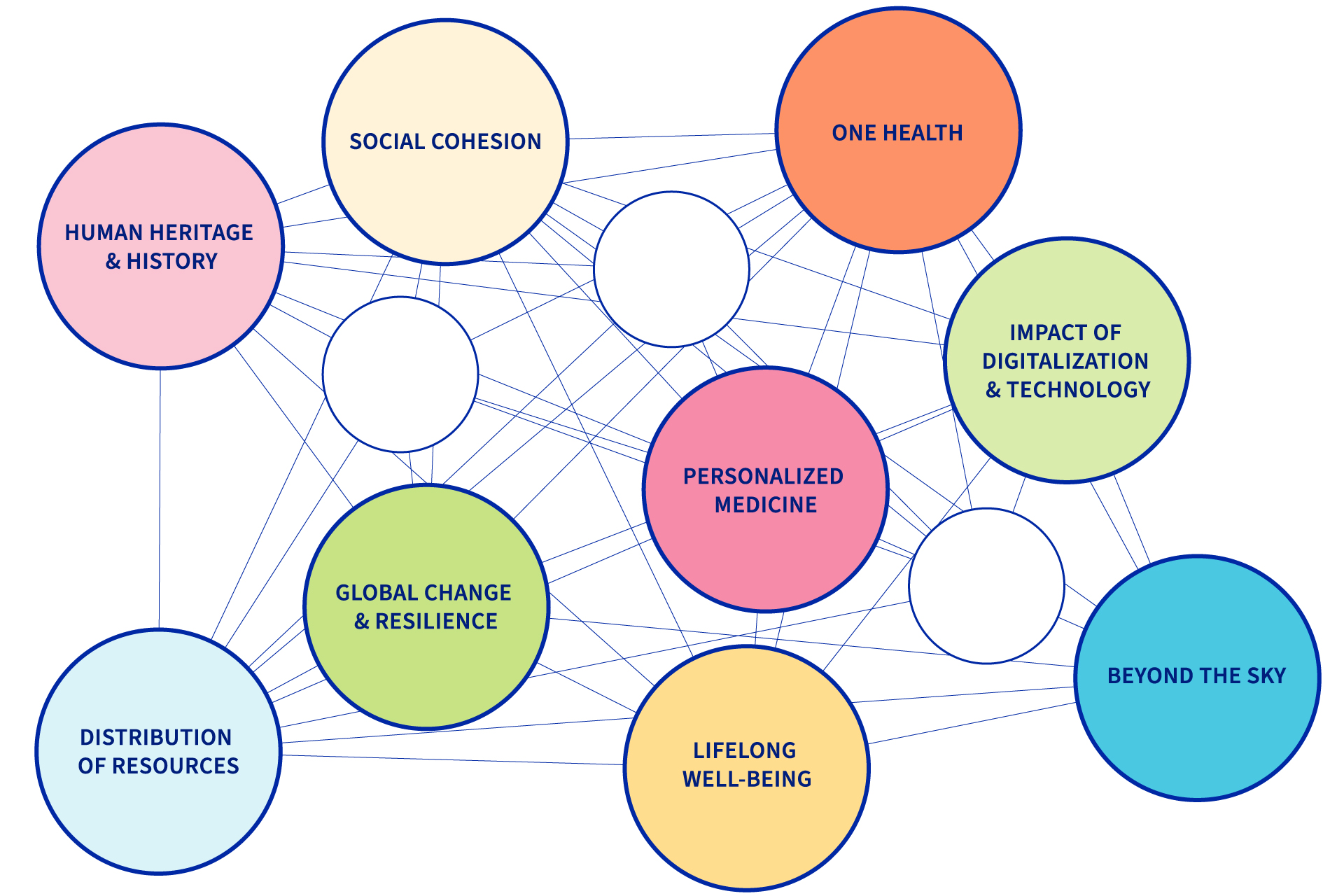Eikon. Communicative Positioning UZH

Thanks to its academic excellence and unique, forward-looking research, the University of Zurich (UZH) already enjoys a favorable view among the public and a strong presence in the media. However, to further strengthen and specify its communicative positioning, the University has launched "Eikon" – a project to create an unmistakably clear identity and its communication.
As a first step, President Michael Schaepman together with a team at UZH and a strategy consultancy, developed the foundations for UZH’s future communicative positioning. Based on a workshop with the Executive Board of the University (UL) and representatives of various stakeholder groups, as well as surveys and conversations with key players on campus, a proposal was created to clearly identify the vision, values and claims that are meant to represent UZH.
The Eikon Project
In a second step, an expanded team (see below) was formed to collaboratively drive the project forward using various methods and approaches.
The project consists of three interrelated focal points:
- The draft of our current vision, values, and claims will be shared with different stakeholders with the aim of considering and discursively sharpening these elements in a participative and creative manner, or if necessary, to revise and further develop them.
- Research topics in which UZH is scientifically excellent, socially relevant, offer a unique selling point, and for which suitable ambassadors among UZH staff are available, will be identified.
- A campaign strategy and its corresponding operationalization will be developed and tested through individual interviews.
Vision, Values and Claims
In the first step, the previously developed elements were shortened and formulated more concisely before being tested for relevance and relatability using various approaches. To this end, all UZH members were invited to participate in a survey, and smaller group workshops were conducted. The insights gained from these activities were used to refine and adapt the vision, values, and claims.
Ultimately, we hope all members of UZH will feel empowered and excited by the opportunity to contribute to shaping how we communicate our vision and values in a relatable and engaging way, thereby creating deeper connections with the university and fostering stronger engagement.
Research Topics and Ambassadors
UZH prides itself on having excellent research topics that are not only scientifically relevant but also have a societal impact. In the future, UZH would like to communicate our specific research priorities more actively and effectively. With this aim in mind, the following questions were explored:
- In which research topics is UZH scientifically excellent?
- Which topics demonstrate the interdisciplinary breadth of research at UZH?
- Which research topics are the most socially relevant?
- For which research topics are there suitable ambassadors among UZH staff?
Based on the answers, nine research topics were defined:
- Lifelong Well-Being. Human development and health – physical and mental – throughout the life-span
- Personalized Medicine. Research into the causes and treatment of diseases, taking into account individual factors and circumstances
- One Health. Understanding the connections between human, animal, plant, and environmental health
- Global Change & Resilience. Global environmental changes and their consequences for people and society – challenges and solutions
- Beyond the Sky. Space, spaces, and systems that transcend human experience
- Impact of Digitalization & Technology. Potential and responsible use of (digital) technology in all areas of life
- Distribution of Resources. Challenges that arise concerning the fair distribution of material and immaterial goods
- Social Cohesion. Social, political, and legal factors that shape social cohesion
- Human Heritage & History. Origin, development and (cultural) history of humankind in all its diversity
The developed research topics as well as the elements of AP1 are to be represented especially by ambassadors. In spring 2024, an open call was made via the faculty management looking for interested researchers who would like to volunteer as UZH ambassadors. The following criteria were used in the selection of UZH ambassadors: excellence in research, experience in knowledge transfer, interdisciplinary representation, future potential as well as commitment and openness to participation.
Campaign and Individual Interviews
Based on the vision, values, and claims as well as the research topics, a campaign strategy was developed. Key stakeholder groups and their needs were defined and clustered, storyboards were created, and three campaign ideas were designed. The campaign concept was tested through a survey. Representatives of each stakeholder group were consulted in personal interviews using a structured questionnaire. Based on these findings, recommendations for implementation are now being developed.
Project Organization
Steering Committee:
- Michael Schaepman, President
- Gabriele Siegert, Deputy President and Vice President Education and Student Affairs
- Christian Schwarzenegger, Vice President Faculty Affairs and Scientific Information
- Dorothea Lüddeckens, Dean of the Faculty of Theology and the Study of Religion
Project Lead:
Sandra Cortesi, Senior Assistant at the Institute of Communication Science and Media Research
Lead Project Focal Points:
- Vision, Values, Claims: Sandra Cortesi
- Research Topics and Ambassadors: Lisa Müller, Research & Grants Office
- Campaign: Nathaly Bachmann, Essence Relations AG
Project Team:
- Communications Office: Beat Müller, Priska Feichter, Anita Lussman
- Strategic Projects: Nadine Schmid
